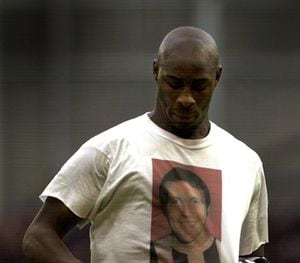Research prompted by Jeff Astle's death reveals link between football and dementia
Landmark research prompted by the death of Albion hero Jeff Astle has found ex-footballers are around three-and-a-half times more likely to die from dementia than the general population.

The study began after a long campaign by the family of the West Brom striker who died in 2002.
The Astle family battled for years for recognition from the football authorities that the death of the former England footballer was caused by him heading the ball throughout his career.
Astle's death was found to have been caused by chronic traumatic encephalopathy (CTE), a progressive brain condition traditionally associated with boxers.

The report assessed the medical records of 7,676 men who played professional football in Scotland between 1900 and 1976.
Their records were matched against more than 23,000 individuals from the general population, with the study led by consultant neuropathologist Dr Willie Stewart of Glasgow University.
His findings report that the “risk ranged from a five-fold increase in Alzheimer’s disease, through an approximately four-fold increase in motor neurone disease, to a two-fold Parkinson’s disease in former professional footballers compared to population controls”.
Although footballers had higher risk of death from neurodegenerative disease, they were less likely to die of other common diseases, such as heart disease and some cancers, including lung cancer.
The study – titled ‘Football’s Influence on Lifelong Health and Dementia Risk’ or FIELD for short – found that deaths in ex-footballers were lower than expected up to age 70, and higher than expected over that age.
Dr Stewart said in a statement: “An important aspect of this work has been the ability to look across a range of health outcomes in former professional footballers. This allows us to build a more complete picture of health in this population.
“Our data show that while former footballers had higher dementia rates, they had lower rates of death due to other major diseases.
“As such, whilst every effort must be made to identify the factors contributing to the increased risk of neurodegenerative disease to allow this risk to be reduced, there are also wider potential health benefits of playing football to be considered.”
The study was released today and commissioned by the Football Association and the Professional Footballers’ Association.
FA chairman Greg Clarke said: “The whole game must recognise that this is only the start of our understanding and there are many questions that still need to be answered.

“It is important that the global football family now unites to find the answers and provide a greater understanding of this complex issue. The FA is committed to doing all it can to make that happen.”
PFA chief executive Gordon Taylor said it was “incumbent on football globally to come together to address this issue in a comprehensive and united manner”.
He added: “Research must continue to answer more specific questions about what needs to be done to identify and reduce risk factors.”
It is not clear from the study what the exact causes of the increased rates of dementia are.
The FA said in a statement: “The study does not determine whether the cause is due to concussions suffered by the group of professional footballers, or concussion management, or heading of the football, or style of play, or the design and composition of footballs over the years, or personal lifestyle, or some other factor.”
The governing body said the study’s findings had been reviewed by an independent Medical and Football Advisory Group, which recommended re-issuing the current FA concussion guidelines and best-practice advice for coaching heading and called for further steps to improve head injury management, like supporting UEFA’s proposals to introduce concussion substitutes.
The group said more research was needed and there was “not enough evidence at this stage to make other changes to the way the modern-day game is played”.

The FA said it was not important to try and establish “whether or not the results from this historic group of former professional footballers relates, in any way, to the modern-day professional footballer”.
It said it had written to Fifa and Uefa to offer its full support on future research in this area as well as share the findings of the study with them.
Jeff Astle's family set up a foundation in his honour to raise awareness of brain injuries in all forms of sport and offer support to those affected.
To help the campaign West Brom held Jeff Astle Day in 2015 at the team's match against Leicester City.
A Justice for Jeff banner had been flown by supporters that season as the campaign gathered momentum.

The day after Astle died The Hawthorns honoured their hero, nicknamed The King, during a derby match against Walsall.
Albion striker Jason Roberts scored the winning goal before revealing a shirt showing an image of Astle.





